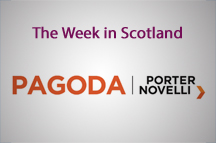 So what does Brexit mean for Scotland? As Theresa May sought to put some flesh on the Brexit bones the “double constitutional” debate continued in Scotland.
So what does Brexit mean for Scotland? As Theresa May sought to put some flesh on the Brexit bones the “double constitutional” debate continued in Scotland.
The SNP, desperate to promote the potential that Brexit can give to their ongoing push for independence, continued to highlight difficulties. Indeed First Minister Nicola Sturgeon cannot have believed her luck that Theresa May and Amber Rudd should have chosen to pursue what effectively constituted a UKIP line on immigration at the UK Conservative Party conference.
Scottish conservative Leader, Ruth Davidson, who enjoyed high profile and successful conference, was put on the back foot and had to distance herself from the new Prime Minister when Rudd and May’s comments on immigration all but dominated this week’s First Minister’s Questions.
Brexit, and the possibility of the UK leaving the single market, is a hard sell for Davidson given the EU referendum outcome in Scotland and the possibility that it could trigger “IndyRef2”. However Davidson has caught the mood of the nation in calculating that whatever the outcome of Brexit talks there is no demand for a second independence referendum while accusing Nicola Sturgeon of using the referendum result as a “constitutional chisel” to break up the UK instead of listening to the concerns of business about disengagement from the EU.
 In a “Brexit” report for Holyrood’s Culture, Europe and External Relations committee (CEERC), the Fraser of Allander Institute examined a number of alternative scenarios.
In a “Brexit” report for Holyrood’s Culture, Europe and External Relations committee (CEERC), the Fraser of Allander Institute examined a number of alternative scenarios.
The ‘hard Brexit’ approach involving leaving the single market, apparently favoured by Theresa May, is labelled “pessimistic” by the report, warning it could result in a two per cent drop in Scottish GDP, with the loss of between 30,000 and 80,000 jobs and a reduction in wages. However, it also says Scotland may benefit from some migration from other parts of the UK.
And Scotland needs migrants. This week’s Convention of Scottish Local Authorities conference was reminded of the demographic time bomb that will put immense pressure on care budgets in Scotland. A combination of massive growth in Scotland’s elderly population, budget cuts and the possible loss of valued employees from EU countries who work in the care sector amounts to a potential triple whammy.
So what will be the Brexit outcome for Scotland? Dundee University’s Professor Alan Page, in his paper for the CEERC, argued that Scotland could gain significant levels of independence over farming, fisheries and areas of industrial policy if the Scottish Government were to strike the right deal with UK ministers post Brexit. Both the Scottish Conservatives and influential SNP MSP’s welcomed this advice, with former Health Secretary Alex Neil asking the Scottish government to maximise the “Brexit dividend”.
So with no evidence of a rise in support for independence following the June 23rd vote, enhanced powers for Scotland’s parliament would provide the SNP with a reason for not calling Indyref2 and help Ruth Davidson to continue her ascendancy.












